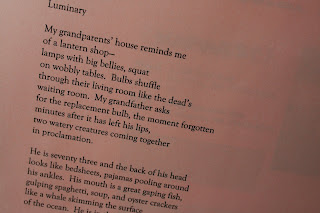
After a department meeting, my friend Emily and I made the sluggish journey to Uptown, where Eireann was giving a reading at an adorable tea shop called the Tea Garden.
As I drove home afterwards I jotted a few things down on the notebook in my lap (I have taken to carrying my bulky camera with me, and I've always carried a notebook, but now I've begun to have it out, at the ready, these words slipping in and out so rapidly--in fact, what I wrote was not even what I thought, and I liked what I had thought, but I am not fast enough while driving at seventy miles an hour):
The sound of the espresso grinder loud and percussive. I would have been easily distracted, fallen into disappointment at the smothering, but Eireann remained solid, confident in her stance, her words lifting above the usual din of coffeeshop. Outside, the world of Minneapolis went on, but here, within, we listened to poems woven, made of muslin, of calico, of grosgrain ribbon. Tonight, we are the beneficiaries of words, good poetry.
Eireann read both from her book and poems printed out, recent, and near-recent. There was one, and I wish I could remember which, but it made me gasp because a moment was so startling, and I thought to myself, "This is what good writing does. It surprises the reader and gives us something that begins like a warm stone in the heart, radiates, feels as if you want to keep it there forever." It's so hard to do that, especially if you are the person who feels everything has already been said.
This is what Zachary from the Tuesday writing group said two days ago: that we live in a culture where everything feels as if it has already been done, been said, that there are so many options, and our generation struggles against this. Of the eight people in the room in Minneapolis, Eireann and Zachary exuded the most knowledge and authority, but didn't seem too put off by the bumblers (and I really am mostly referencing me here) who are earnest but not as learned. (I always feel like such a failure in the gathering of knowledge department, always a little behind the storm, just trying to catch the lightning before the best fireworks are gone.) Later, I discovered that Zachary is of Gendun Editions, which explains why he was interested in what font I had used in the poems I distributed on accidental salmon paper.
I think to myself, today, as I see Scott King, owner of Red Dragonfly Press and husband of a colleague, and as I think back to Zachary with his thick poem and reams of poets to recommend, his memorized Hugo poem (in French, no less), his recognition of the stylings of language poets, his poise and confidence that he was meant to be writing poetry, and his description from the prompt, of broken wrist bones and fierceness, his startling women in his workshopped poem--I think of these people, and I wonder: How do they get these jobs? How is it that I am trying to keep students from whacking each other and leaving gum under their desks and these folks are writing poems and sliding them through antique machines, creating these gorgeous pieces of art and bringing words into the lives of others?
I think a lot of it is knowing what you want and taking risks. And so much more is about talent. And of course, maybe even just being in the right place at the right time, knowing people. For now, I will bask in the glory of others, know that I am truly enjoying myself, and continue to scribble myself. I am returning to myself. Hello, poet. Hello, poetry.
Oh, and I ran into an old classmate from the U at the reading. We took an advanced poetry workshop with Ray Gonzalez. She spoke of the MFA program there and coming out with disappointment, that she went in with expectations, and is afraid there aren't many female mentors and isn't a lot of funding to replace a poet who is phasing out. She also said she went for one specific professor, who she had taken a brief course with in Iowa, but it turns out she'd essentially learned all she needed to know from him in that brief course, that this person taught the same things again and again. I'd had this professor as well and enjoyed him, but I forget easily and needed to hear the same thing; at the time, I essentially needed that environment to begin to grow. We go into these things with different needs and expectations, and I guess a big part of what I need to consider now is what do I want, what do I need (beyond the big question: am I talented enough? but I won't even touch that one now, so late on a school night).




Scenes from a poetry reading aftermath.








